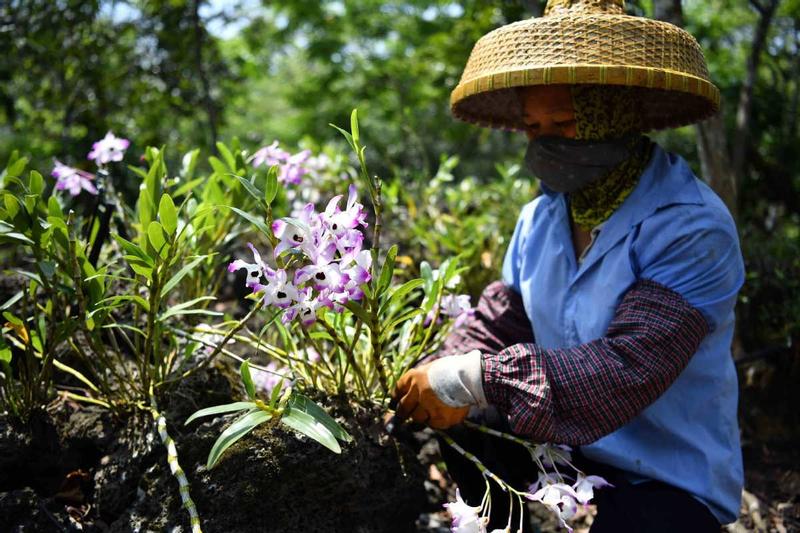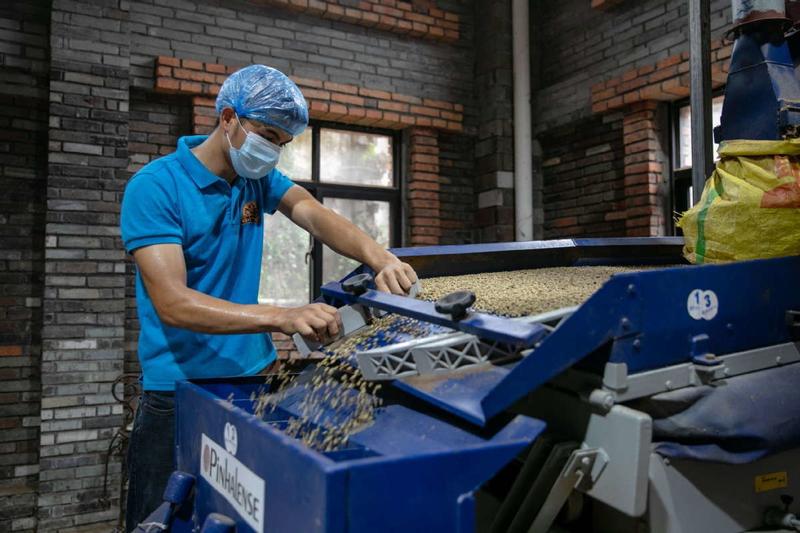 Coffee production in Fushan, Hainan province, has brought prosperity to farmers. (YE XIAOLIN / CHINA DAILY)
Coffee production in Fushan, Hainan province, has brought prosperity to farmers. (YE XIAOLIN / CHINA DAILY)
China is known for its tea, but most residents of Fushan township on the tropical island province of Hainan have become accustomed to starting their day with a cup of coffee. Xu Shibing is one of them.
I hope to use my knowledge to boost prosperity in my hometown and enjoy a better standard of living with my fellow villagers.
Wu Qingwei, technician from Shicha village
Xu, manager of the Fushan Coffee Industry Co, has worked in the trade for about 20 years, helping farmers grow and sell coffee. He has also put the township on the road to prosperity.
"My dream is for more people to taste our special-flavored coffee and spread news of it to the world," said the 52-year-old, who chairs the Hainan Coffee Association.
Fushan is located on the same latitude as the Blue Mountains in Jamaica and volcanic mountains in Kona, Hawaii-both key coffee cultivation areas.
Xu said Fushan's red earth, which is rich in the mineral selenium, aids the growth of coffee plants, producing a drink with a unique flavor.
ALSO READ: Coffee culture hits new highs
Although annual production of Fushan coffee is not high, the local environment and the company's carbon roasting technique help give the drink its flavor and strength, Xu added.
Wang Xifei, Party secretary of Fushan township, said 252 hectares of land are used to grow coffee plants in the township, yielding 795,000 kilograms of coffee a year, with an annual value of 31 million yuan (US$4.42 million). There are also more than 30 coffee shops in the area, which has a population of 18,000.
After seeing the benefits of coffee production, Wang decided to use more vacant land to expand the plantation. He encouraged other farmers to join the industry to boost their earnings. In addition, he said one-day trips to Fushan are being planned for visitors to aid development of the township.
Fu Cefu, a farmer in Fushan, was skeptical about making a profit from the plantation, until two years ago when he started working with Xu. Previously, the 46-year-old with a family of five earned a living from growing bananas.
"Life was hard, as the banana plantation relied too much on the weather. If there were frequent typhoons, I had almost no harvest," he said.
This meant it was difficult for him to afford the tuition fees of his three children-one in high school and two in primary school.
However, Fu now earns a steady income of 20,000 yuan a year from the 0.2 hectare of land used to cultivate coffee plants.
"Xu gives me the coffee seeds to grow, and his company is responsible for roasting and sales. I don't need to worry about there being no market for my coffee, and this has given me a great sense of security," he said.
A stable income, in addition to earnings from growing bananas, has lifted Fu's family out of poverty. "The most important thing is that I feel secure for life," he added.
The plantation has helped 27 other impoverished people in the township improve their lives. Another 1,000 local residents have sought jobs in the industry.
Xu said he has never worried about the market for Fushan coffee, "as our product has a different flavor and is especially strong".
Ji Changxun, a barista working for Xu's company, said, "Our carbon roasting gives the coffee its special flavor," adding that the drink helps attract tourists.
 Villagers in Shicha, Hainan, have benefited from growing dendrobium to produce a traditional Chinese herbal medicine. (YE XIAOLIN / CHINA DAILY)
Villagers in Shicha, Hainan, have benefited from growing dendrobium to produce a traditional Chinese herbal medicine. (YE XIAOLIN / CHINA DAILY)
Scenic spot
Meanwhile, some 50 kilometers from Fushan, Shicha village has found prosperity by cultivating a plant that thrives on volcanic rocks.
Located at the foot of a volcano, the village has developed dendrobium, a traditional Chinese herbal medicine. It has also promoted tourism by transforming the conservation center for the product into a scenic spot. As a result, annual per capita income in Shicha rose from 3,600 yuan in 2013 to 24,000 yuan last year, according to Hong Yiqian, head of the village committee.
"I was annoyed with the state of our land and by a water shortage, but after learning in 2015 that such conditions were good for growing dendrobium plants, the village and people's lives changed," Hong said.
Just over 53 hectares of land is used in Shicha to grow the plants, which have resulted in more than 200 villagers finding jobs and prompted other agricultural cultivation, he added.
In 2015, Zhou Xian, a 38-year-old mother of three, quit her job as a saleswoman in Haikou, capital of Hainan, and returned to the village-her hometown-to become a security guard at the conservation center.
In Haikou, she earned 1,800 yuan a month working in a shop, but she said that commuting by bus, which took her more than two hours a day, was exhausting.
Now, Zhou walks to the center every day and earns as much as 2,650 yuan per month. "Life has become easier. I can save on commuting time to be with my family," she said.
 A technician checks dendrobium plants in Shicha village, which is located at the foot of a volcano. The local soil is ideal for growing the plants. (GUO CHENG / XINHUA)
A technician checks dendrobium plants in Shicha village, which is located at the foot of a volcano. The local soil is ideal for growing the plants. (GUO CHENG / XINHUA)
Smart cultivation
After finding the best products to help the areas develop, Shicha and Fushan stepped up efforts to improve the quality and efficiency of cultivation.
For example, instead of artificial watering, farmers in Shicha use an intelligent remote control system to irrigate dendrobium plants.
Wu Qingwei, a technician from the village, showed how the system works. By opening an app on his phone, he can monitor the temperature at the plantation to see if the plants need watering.
"This system not only saves water, it has made the villagers realize they do not need to water the plants on hot days," the college graduate, 28, said, adding that use of such technology will contribute greatly to agricultural development.
Until 2016, Wu worked in the tourist resort of Sanya, Hainan, but after sensing that there was a market for cultivating special products, he returned to Shicha.
"I hope to use my knowledge to boost prosperity in my hometown and enjoy a better standard of living with my fellow villagers," said Wu, who studied agricultural economic management at college.
Xu, the Fushan Coffee Industry Co manager, like Wu, is confident about the future for such cultivation, especially after a series of preferential policies were announced to develop Hainan Free Trade Port.
"I feel that I'm closer to realizing my dream of taking the coffee brand global, as I believe these policies will attract more foreign investment to Hainan and further promote the consumption of Chinese coffee," Xu said.
 Coffee production in Fushan, Hainan province, has brought prosperity to farmers. (YE XIAOLIN / CHINA DAILY)
Coffee production in Fushan, Hainan province, has brought prosperity to farmers. (YE XIAOLIN / CHINA DAILY)
Attractive prospect
According to a report by CoffeeBI, an independent consulting company specializing in the industry, in 2018, China was one of the largest growth markets for coffee shops. Such expansion is an attractive prospect for large international chains, the report added.
It also cited market analysts as saying that coffee consumption in China is growing by about 20 percent annually, more than 2 percent higher than the global rate.
This encouraging figure and development of Hainan Free Trade Port spurred Xu to promote coffee cultivation. He said he will learn more advanced coffee roasting techniques and buy better equipment to improve production and quality.
READ MORE: China coffee unicorn splashing millions to overtake Starbucks
Wang, the government official, said: "We're planning one-day trips to Fushan based around the coffee industry, with the aim of attracting tourists to enjoy the drink and to pick tropical fruit on weekends. "
Hong, from Shicha village, applauded these developments, adding that they will enable villagers to earn more in the pursuit of xiaokang-a moderately prosperous society in all respects as soon as possible.
"In developing the dendrobium industry, we want more people to come to our village with their families to spend a day learning about how the product is produced, as well as witnessing the changes made in recent years," he added.


